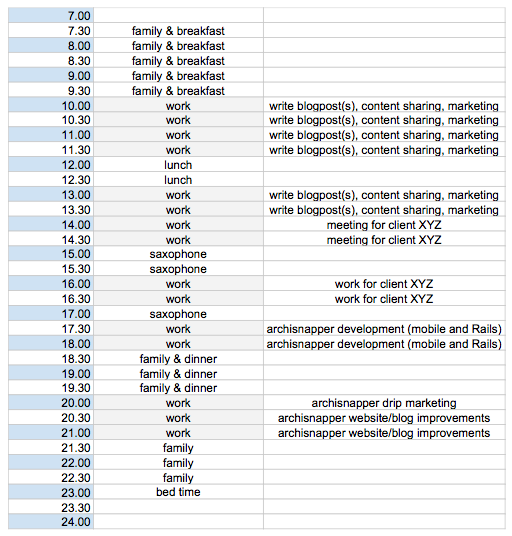
During a holiday break, you often realize certain things about your way of working that you don’t see at all while you are in your day to day stream of work. A complete break of a few days will power off your working brain completely, and will give your mind the opportunity to think in a different and creative way.
One of the conclusions I made during the last Christmas and New Year holidays was that the last few weeks of 2013 I working always, everywhere, and on everything at the same time. But in reality I was never really working and never taking a real break, and because I worked on everything at the same time, I was working on nothing for real. Working very hard from early in the morning until late at night and always jumping on the next small urgency is a perfect way to look very busy – and a perfect way to be very unproductive.
There were mainly 2 problems…
First problem: there was no clear cut between work and play.
I often had my laptop next to me during dinner, just in case an urgency would pop up (not the best way to enjoy your dinner and family time). I checked my emails on my smartphone late at night right before going to sleep (not the best way to relax and get 8h of sleep). I would take my iPad everywhere with me so I could work from anywhere, just in case.
This is so wrong. Working all the time and everywhere is not a sign of efficiency or effectiveness. It’s a weakness. If the only way to run your business is by working 16h a day, you are in the wrong business. There are plenty of industries where working 8h, 6h or 4h per day (or per week!) is enough to run a very profitable business – that is, if you work smart. On average, my business does not require me to work more than 8h per day… given one works efficient, effective, to the point, dedicated, well rested and full of energy and focus.
The more time to you have to finish a task, the more time you will waste on unnecessary details, fine-tuning, procrastination, Twitter, emails, jokes, cleaning your office, trying out a new app, and all kind of distractions that have nothing to do with the real work.
So here is a very simple thing that I will try to do from today on. Each morning, I’ll spend 10 minutes setting up a very simple “work / play scheme” for that day. It looks more or less like this (and will probably be slightly different each day):

The day has a very clear separation between “work” and “play” blocks, and comes with one very simple rule:
ONE SHALL NOT WORK DURING THE PLAY BLOCKS
“Uh…but what if I have a lot of work?! 8 hours is not enough!”
Well, then make sure you get it done during the working blocks. Skip the non essential stuff to finish your task. You can do it. If you know you only have 2 hours to answer that RFP, then you’ll make it in 2 hours. Without a time limit, you’ll probably work 4 or even 6 hours on it – half of your time distracted by Facebook, reading blogposts and checking your mailbox every 10 minutes.
The exact start and stop time and the length of the time block do not really matter. For me they’ll be different each day – one day I’ll start sooner, the other day later, depending on some personal things like if I have to bring my daughter to the kindergarten in the morning or not, if I have saxophone classes or not in the evening, if I’ll cook for dinner or not that day. Probably I’ll end up with an “early” variation, and a “late” variation of this day scheme.
It’s mind relaxing and stress reducing to define clearly in advance which hours you’ll work and which hours you’ll play. I’m sure it results in much more focus and attention during the work blocks. As well as much more joy, fun and pleasure during the play blocks. A clear cut between both work and play time ensures work will feel like work, and play will be like play. Actually printing out the work schedule each day and visualizing it in front of you on your desk will give even more structure to your day, since you will really feel obliged to follow your commitments and stick to the schedule.
Second problem: working on everything at the same time
The other problem was the difficulty to get into a highly productive and efficient working flow. Checking your email, tweeting, answering a phone call, reading a blogpost, writing some code and correcting a typo on your website are all very useful tasks. But not if you do them in the same 30 minutes, since there is way to much context switching. It’s so much more efficient to code for 2 hours, then spend an hour or 2 on writing a blogpost, and then cleaning your mailbox for another hour. That’s 5 hours of well oriented and focussed work. If you’d jump on every task that is thrown at you (and if you run a business or you are freelancer, there are whole lot of todo’s thrown at you all the time, everywhere, 24/7), you are switching context all day long, and you’ll never get into a deep, relaxed, focussed and dedicated working flow.
You all know how it feels to be “in the zone” or “in the flow”. Time and place disappear, you are in the now, working very dedicated on one single thing that has all your attention. It does not feel like working. But you all know as well how a hectic, disoriented, chaotic day full of urgencies screaming for attention feels like. It’s depressing. You feel like nothing has been done, although a lot of energy has been spilled and you feel very tired at the end of the day.
In order to force myself into flow, every morning – when defining my “work” and my “play” blocks – I’ll pick a set of tasks I want to get done that day, and I’ll assign them to the work blocks for that day. Today, the tasks are:
- write a blogpost and have it published, as well as some online marketing and content sharing (content marketing is our main marketing strategy for Zorros and ArchiSnapper)
- do a meeting with client XYZ (was already decided so I did’t actually choose this one)
- work 1 hour for client XYZ
- do some technical things (feature analysis, planning next release, …) for ArchiSnapper
- set up 1 drip email for ArchiSnapper
- review and work on our ArchiSnapper blog structure, layout, and see how I can make it convert better
Then I will assign these tasks over the different working blocks for that day, and I’ll try to get them done. Again, by being allowed to work during PLAY time blocks, I’ll have to focus purely on these tasks during the work blocks. I know upfront that if I’m too distracted with other todo’s popping up, I’m not going to make my todo list of the day. My every day goal is then to finish my little todo list for that day during the work blocks, and then disappear from work for the rest of the day.
I’m sure I’ll work less hours, more relaxed, and I’ll have more done at the end of the day.
2 birds, 1 stone: my saxophone playing and sound will get so much better!
As you have probably noticed, there is 1.5h in the play blocks foreseen for practicing saxophone. I love playing jazz and funk saxophone. Playing an instrument (just like doing sport or any other kind of complete distraction) obliges you to be only in that moment and forget about everything else. It’s a very good way to completely relax and enjoy life. During a jazz concert, you better not worry about work or your empty fridge, or your next solo might sound not so cool :-)
As with anything, if you want to become better, you’ll have to work on it. Nobody was born as a good saxophone monster. Charlie Parker practiced 14h per day during years. My teacher says that 1h of saxophone practice per day is the absolute minimum to get better, play the horn more natural, make it sound exactly what you want it to sound like and construct a nice solo. And studies have shown that you need 10.000 hours of practice to master anything like a pro. By planning in 1h to 1.5h of dedicated saxophone practice in my daily schedule, I’m sure I’ll become a better saxophone player day after day, and I’ll enjoy at least 1h per day of complete distraction from work. 2 birds, 1 stone!
Hear it yourself!
Below are 2 samples. Try to guess who is the guy who has a serious practice routine and who is the one playing the sax every now and then.
Sax1
Sax2
Did you hear it?
I’m sure you did notice a difference in sound, quality, feeling, expression and swing. If not, I’m sorry but then by all means don’t go for a career in the music industry :-)
Thoughts?








